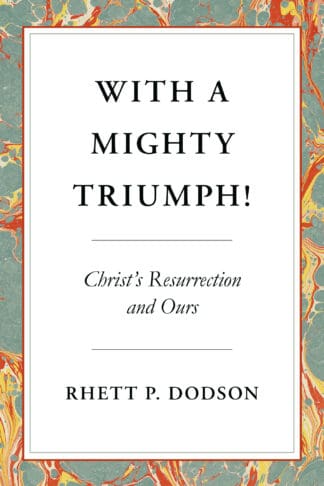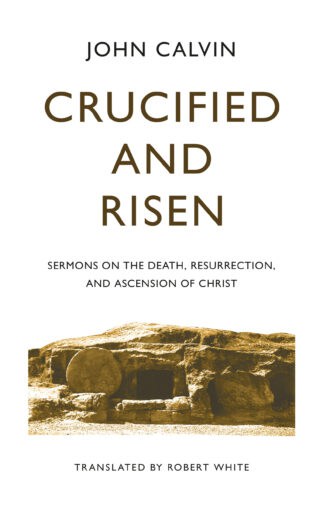The Happiest of Disappointments
‘See Mary weeping.’ So runs the invitation in the Townend-Getty Easter hymn, See What a Morning. Mary has come to Jesus’ tomb on the morning of the first day of the week and stands outside it weeping. Why is she weeping? She gives us the answer herself: ‘They have taken away my Lord, and I do not know where they have laid him’ (John 20:13). She had come with spices and ointment to anoint the Saviour’s body and it wasn’t there. Why was it not there? For Mary there was only one explanation: someone had taken it away. Hence her words to the man whom she mistakenly supposed to be the gardener: ‘Sir, if you have carried him away, tell me where you have laid him, and I will take him away’ (John 20:15).
Her wish being granted
As you see Mary weeping, imagine her wish being granted. She has come to perform this last loving service to Jesus’ body–and Jesus’ body is there. Or suppose that the man to whom she speaks is indeed the gardener and that he can take her to the place where Jesus’ body has been put. What follows from that? There has been no resurrection. The Christ who died is dead. He is just as lifeless on the first day of the week as he was when they laid him in the tomb. What follows from that? Disaster!
An old writer by the name of Ralph Wardlaw once said of Jesus’ resurrection, ‘It is manifestly one of the main pillars of the Christian edifice. Were it overthrown the entire structure would infallibly come to ruin.’ It’s a bit like blinded Samson, placed between the pillars of the Philistine temple, pushing with all his great strength, and bringing it crashing down. That’s what would happen to Christianity, says Wardlaw, if on resurrection morning Mary had had her wish. A still-dead Jesus would reduce Christianity to ruins.
Let’s listen to Paul. In the fifteenth chapter of his first letter to the Corinthians he addresses this matter at length: what would come of Christ not being raised from the dead? The answer is sobering in the extreme. He writes, ‘if Christ has not been raised, then our preaching is in vain and your faith is in vain’ (v.14). Again, ‘if Christ has not been raised, your faith is futile and you are still in your sins. Then those also who have fallen asleep in Christ have perished. If in Christ we have hope in this life only, we are of all people the most to be pitied’ (vs.17-19).
Words could not be more plain. A non-resurrected Christ would have the direst implications for our faith, for believers who have died, for our Christian hope, and for the message of the gospel. We indispensably need a living Saviour. And if that is not what Jesus is there is no forgiveness of sins for those who are trusting him, no heaven for those who have died believing in him, no hope of resurrection for ourselves, and no good news of salvation for our so desperately needy world. How much is left when you take all that out?
Which brings us back to Mary–and to a little poem that says it all. It is entitled What if you had your wish?
Oh, the anguish of Mary!
The depth of despair!
When she came to the tomb
And the Lord was not there;
As she desolate stood
With her balm and her myrrh,
And his winding sheet only
Was waiting for her.
Oh, the blackness of death!
Oh, life’s utter despair!
Had she come to the tomb
And the Lord had been there;
Lying wrapped in a sheet
With the balm and the myrrh,
And no risen Redeemer
Was waiting for her.
Her wish being denied
When it comes to seeing the kindness of God in denying us what we wish faith sometimes has a very hard time of it. Mary’s story may help us. What a bitter disappointment to be denied her wish! But the tragedy, as we have seen, would have lain in the granting of her wish; the kindness lies all in its refusal. To be sure, she did not find the body she had come to anoint. But she did find a Saviour alive from the dead!
It is one of the most touching scenes in the Bible. Mary does not know that it is Jesus. She supposes him to be the gardener. ‘Sir, if you have carried him away, tell me where you have laid him, and I will take him away’ (John 20:15). But the Lord has something infinitely better in store for Mary than the care of his dead body. He is going to reveal himself to her as risen. Alive. And he does it with a single word. He simply says her name: ‘Mary’ (v.16). And that is all that it takes. At the sound of her name she turns to him and cries, ‘”Rabboni!” (which means teacher)’ (v.16).
Isn’t it a beautiful picture? Mary is denied her wish. She doesn’t get to do the thing on which her heart was so much set. But see what she does get! She gets to see her Lord and Saviour alive from the dead. She gets to go and say to his disciples, ‘I have seen the Lord’ (v.18). And in the light of what we have heard from Paul in 1 Corinthians 15, the implications of her experience and testimony are vast.
Think about our faith in Jesus. Had Jesus been dead, there would have nothing more futile than entrusting ourselves to him for salvation. A dead Saviour cannot save. But a living one can–and does.
Think about those who have died in Jesus. Have they perished? Not remotely! They are with him right now in glory and one day will return with him to experience resurrection themselves.
Think about our hope in Jesus. It will certainly be fulfilled! He is coming again and all things will be made new. Far from being the most pitiable of people believers are far and away the most enviable.
And what a message we have! We point people to Jesus. We tell them to look to him and to him alone for salvation. And to do so expectantly. What a cruel thing that would be were he still in the grave! But the Jesus whom we preach is alive and lives now to save. With absolute confidence, therefore, we may say to every man, woman, boy, and girl that if they will turn to him in their need he will assuredly be a Saviour to them.
Of Further Interest

With A Mighty Triumph!
Christ's Resurrection and Ours
Description
‘See Mary weeping.’ So runs the invitation in the Townend-Getty Easter hymn, See What a Morning. Mary has come to Jesus’ tomb on the morning of the first day of the week and stands outside it weeping. Why is she weeping? She gives us the answer herself: ‘They have taken away my Lord, and I […]

Crucified and Risen
Sermons on the Death, Resurrection, and Ascension of Christ
Description
‘See Mary weeping.’ So runs the invitation in the Townend-Getty Easter hymn, See What a Morning. Mary has come to Jesus’ tomb on the morning of the first day of the week and stands outside it weeping. Why is she weeping? She gives us the answer herself: ‘They have taken away my Lord, and I […]

Jesus Himself
The Story of the Resurrection
Description
‘See Mary weeping.’ So runs the invitation in the Townend-Getty Easter hymn, See What a Morning. Mary has come to Jesus’ tomb on the morning of the first day of the week and stands outside it weeping. Why is she weeping? She gives us the answer herself: ‘They have taken away my Lord, and I […]
Latest Articles
On the Trail of the Covenanters 12 February 2026
The first two episodes of The Covenanter Story are now available. In an article that first appeared in the February edition of the Banner magazine, Joshua Kellard relates why the witness of the Scottish Covenanters is worthy of the earnest attention of evangelical Christians today. In late November of last year, on the hills above […]
A Martyr’s Last Letter to His Wife 11 February 2026
In the first video of The Covenanter Story, which releases tomorrow, we tell the story of James Guthrie, the first great martyr of the Covenant. On June 1, the day he was executed for high treason, he coursed the following farewell letter to his wife: “My heart,— Being within a few hours to lay down […]
